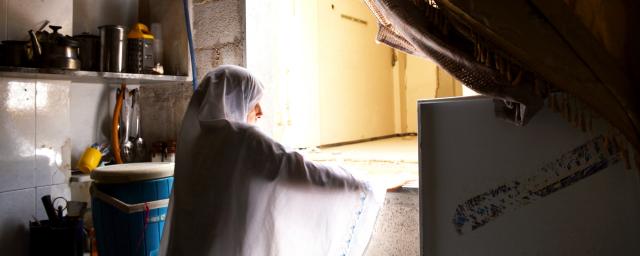
Najwa*, 48, is standing in her partially damaged kitchen in Harasta, Eastern Ghouta, Rural Damascus. She lost her son to war and raises his three little children.
It was my first visit to the outskirts of Damascus since the country went into lockdown to contain the potential spread of the coronavirus. As our car moved closer to Harasta - a town to the northeast of the city - life seemed perfectly normal from afar. But in the midst of a pandemic, things are often not what they seem. For millions around the world who’ve been trapped at home by coronavirus, it’s been a deeply unusual time, but when you’ve lived through over nine years of war, even the deadliest of diseases seem just like another detail.
In March, when the first infection was reported, a curfew was imposed, borders were closed, and travel was restricted between different parts of the country. Only essential shops were allowed to conduct business: shops selling medicine and food. By mid-May however, many restrictions were lifted with no telling as to what that may lead to.
“We might not die of the virus, but we will definitely die of empty stomachs.”
As I walked through Harasta’s markets, I saw crowded food shops, and street vendors spreading their goods on the pavements forcing people to walk in the streets. There was no evidence of anyone attempting to socially distance themselves. It was as crowded as ever.
I met Najwa*, 48, who lives in Harasta with her family of five. She lost her son in the war and raises her three little children relying solely on relatives’ handouts. “We survived the constant fighting, we survived a mortar that hit our building and destroyed our kitchen, we survived the lack of food and water, we survived the long months we had to spend under besiegement when many basic items were not available. At some point bread, sugar and tea were a dream to get. Don’t you think we will survive this virus?” she asked me. Her demeanor cynical.
Coronavirus deepens existing inequalities
While all over the world there are coronavirus related job losses- it’s much, much worse for this war-torn nation and its people, who have been suffering for almost a decade. A crisis within a crisis. As a result of the lockdown, many people, who already live hand-to-mouth, have been unable to make a living. To add insult to injury, prices continue to dramatically increase, making it almost impossible for vulnerable people, who have no alternative resources, to survive the pandemic. “We might not die of the virus, but we will definitely die of empty stomachs,” Najwa said.
When the first case was announced in Syria, people rushed to stock up on food amid fears that authorities will impose strict measures, but not Najwa’s family. “We didn’t even bother to think about storing food since we barely secure our daily bread.”

The curfew meant people only had a limited set of hours where they could purchase essential items. As a result, queues became a daily scene around the country, especially in front of bakeries. What was once readily available everywhere at an affordable price, became a rarity.
“Bread has become a luxury we can’t afford. You should see the congestion around distribution cars. It’s terrible,” said Najwa. “This has pushed many women to make bread in their houses, relying on primitive ovens. I cannot afford to buy fuel for the oven. I’m using pieces of fabric and clothes instead. You have to be innovative in such a crisis,” Najwa added.
A long battle ahead
With the disease now spreading to many countries with high levels of poverty and inequality, its impact could be catastrophic and disproportionally affect women. In a war-torn country like Syria, with an exhausted economy and its healthcare facilities decimated, the coronavirus deepens existing inequalities. Here it’s not only about fighting the virus itself but about withstanding its aftershocks.
Oxfam, and in collaboration with local partner Syrian Society for Social Development (SSSD) is stepping up efforts to support vulnerable families by providing soaps and cleaning materials, to help people maintain good hygiene practices. Oxfam is also increasing the supply of clean water, as well as distributing cash assistance to help those with less purchase more of what they need.
No one really knows when the pandemic will be over, but what we do know is that it can engulf entire communities. Syrians must get the help they need. It could literally mean life or death to many vulnerable communities in Syria.
*Name has been changed to protect identity.
Photos: Dania Kareh/ Oxfam
Help us save lives
As the outbreak of the novel coronavirus continues, we are on the frontlines of preventing catastrophe in some of the world’s most vulnerable places, supporting our local partners and delivering much needed assistance. Your contribution can make a world of difference.